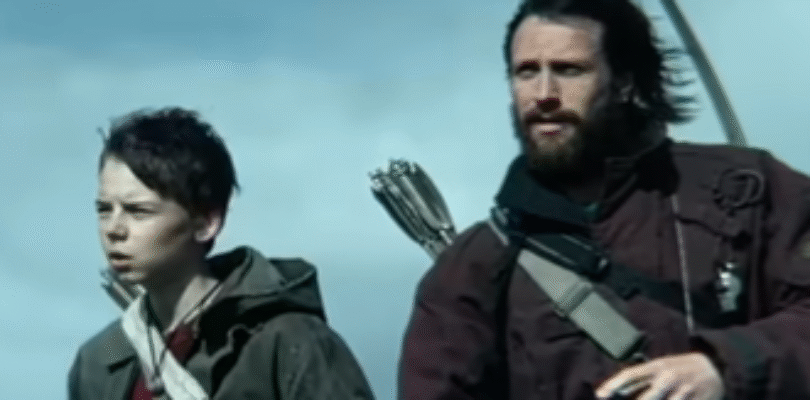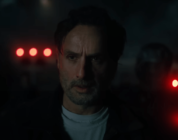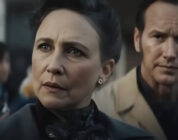Photo: Sony Pictures/YouTube
Once again, Danny Boyle and Alex Garland have made a thinker about the brainless undead. Or rage virus-infected differently alive, whatever. 28 Years Later is the latest zombie movie/geopolitical rumination from the writer-director team. And critics have found a lot to chew on. If 28 Days Later was a reaction to 9/11 and the eruption of sectarian violence disrupting the “end of history” idyll of the 90s, and 28 Weeks Later was about forever wars and police states, 28 Years Later is about being constantly surrounded by death. Just unrelenting, uncaring and constant death. So, standard blockbuster fare. “Three quarters of the way through, 28 Years Later slows the horror to become a rumination on death’s inevitability and life’s carrying on even in the grips of calamity,” Richard Lawson wrote in Vanity Fair. “Really, Boyle’s film is more post-apocalyptic anthropology than anything else, an alluring peer into a near future in which humanity is at a fraught crossroads.” It’s the end of the world in 28 Years Later, and the critics feel fine.
“Some horror fiends will find themselves disappointed with a movie that’s too weird, too somber, too unresolved to deliver on the promised thrills. Predictably, 28 Years Later is said to be the first in a planned trilogy, and it does all the usual to-be-continued stuff, with ominous unexplained signs, dangling character arcs, and one spectacularly goofy final scene that will presumably be explained in subsequent entries. This is a lot of setup with relatively little payoff, with Boyle relying mainly on horror and action clichés to keep things moving along. (You could retitle this Saved at the Last Second by a Previously Unknown Character: The Motion Picture.)” —Bilge Ebiri, Vulture
“The world may have left England to rot (a subplot involving a foreign soldier implies that other nations have taken an active interest in helping that process along), but any society that allows an entire country to become an open-air graveyard is sick with a terrible virus of its own. While Boyle isn’t lofty enough to suggest that the infected are beautiful creatures who deserve God’s love or whatever (this is still a movie about wild-eyed naked zombies, after all, and its empathy for them only goes so far), 28 Years Later effectively uses the tropes of its genre to insist that the line between a tragedy and a statistic is thinner than we think, and more permeable than we realize.” —David Erlich, IndieWire
“One of the chief rewards of 28 Years Later is that it never feels like a cynical attempt to revisit proven material merely for commercial reasons. Instead, the filmmakers appear to have returned to a story whose allegorical commentary on today’s grim political landscape seems more relevant than ever. Intriguing narrative building blocks put in place for future installments mean they can’t come fast enough.” —David Rooney, The Hollywood Reporter
“Where the original film tapped into society’s collective fear of infection, its decades-later follow-up (which undoes any developments implied by 28 Weeks Later with an opening chyron that explains the Rage virus “was driven back from continental Europe”) zeroes in on two even most primal anxieties: fear of death and fear of the other. To which you might well ask, aren’t all horror movies about surviving an unknown threat of some kind? Yes, but few have assumed the psychic toll taken by such violence — or stared death directly in the bloodshot eyes — quite so effectively. Though conceived as the start of a new trilogy, 28 Years Later towers on its own merits.” —Peter Debruge, Variety
“Most threequels tend to go bigger, but 28 Years Later bucks that trend by going smaller, eventually becoming a chamber piece about a boy trying to hold onto his mother. It still delivers shocks, even if the sometimes over-zealous editing distracts from Anthony Dod Mantle’s painterly cinematography, but the biggest of them all is the jaw-dropping final scene, a clapback to the film’s beginning and an indication of how crazy Britain has become in its lonely isolation. It’s a very specific cultural reference, and seemingly comes from nowhere, but Brits in particular are likely to have a very, very visceral reaction, as it happens.” —Damon Wise, Deadline
“No one but Ralph Fiennes could’ve delivered such poignant monologues about death and acceptance without fully taking me out of the story. When his character appears, there’s a significant tonal shift, and the movie’s intention to wrap up and tie up loose ends is palpable. 28 Years Later doesn’t take itself too seriously for the most part, but it’s through Fiennes’ character that Garland and Boyle attempt to impart some wisdom about humanity and death upon the audience. It’s not unwelcome, but it’s a little out of place.” —Mary Kassel, ScreenRant





